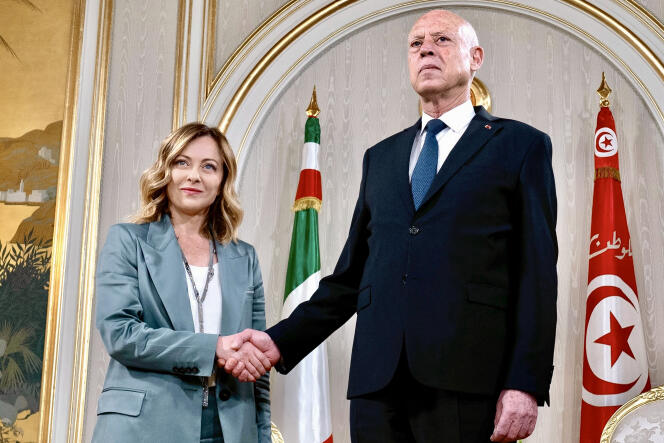
Tunisia continues to occupy a special place in Giorgia Meloni's foreign policy. For the fourth time in less than a year, the Italian prime minister visited Tunis on Wednesday, April 17, to meet her counterpart, President Kais Saied.
Accompanied by a large ministerial delegation, Meloni stayed only a few hours in the Tunisian capital, before flying off for the European Council meeting in Brussels. She took the opportunity to announce several cooperation protocols: direct support worth €50 million to the Tunisian state budget in favor of "energy efficiency and renewable energy," a €55 million credit line to support Tunisian small businesses and a framework agreement to lay the foundations for collaboration in the academic field.
In her "statement to the press" – to which journalists were not invited – Meloni highlighted the agreements as a "completely new," "egalitarian" approach, based on the "mutual interest" of nations, in line with her ambitious Africa policy, placed at the heart of her diplomacy and now inseparable from a migration strategy centered on the objective of putting an end to irregular arrivals on Italian territory.
"We can no longer deal with the migration issue in isolation with our African partners," said a senior Italian diplomatic source. "It must be part of a global approach, based on the requirements of countries of departure and transit."
Tunisia, a test case for Italy's African policy
Meloni's vision, at first a story and a speech, but which is gradually being built from official visits to various agreements, incorporates her concept of a "Mattei Plan for Africa." Launched at the Italy-Africa summit on January 28 and 29, the plan is intended to involve the entire government, as well as various players in the Italian economy. "Giorgia Meloni's latest visit to Tunisia is intended to show that this plan is beginning to have concrete applications and to project the image of diplomacy in action toward her international partners as well as her electorate," said Maria Fantappie, director of the Mediterranean, Middle East and Africa department at the Istituto Affari Internazionali, an influential Roman think tank, adding that "Tunisia is the country where the Italian government's African policy was first put to the test, thanks to the personal relationship between the president of the Council and Kais Saied."
The Tunisian president, who in recent days has repeatedly warned that his country would only deal with other nations "on an equal footing," seems to appreciate Meloni's rhetoric. She is the only European leader with whom he maintains such regular dialogue and she carefully avoids addressing his authoritarian drift. During the visit, Saied welcomed the collaboration and expressed his wish to "strengthen and diversify the ties of cooperation and partnership between the two friendly countries."
It is a desire shared by Rome, for which Tunisia represents a number of interests. In the energy sector, where Italy aims to become a hub between the two shores of the Mediterranean, the two countries' power grids should be interconnected by 2025 via the El Med submarine cable, paving the way for the exploitation of southern Tunisia's vast potential for the production of solar and wind energy.
Tunisia also serves as a transit hub for Algerian gas to the Italian peninsula. Finally, Tunisia is a major outlet for some 900 peninsular companies operating in the country.
On the migration front, as spring brings favorable weather conditions for Mediterranean crossings and the European elections in June are approaching, Meloni is counting on Tunisia's cooperation to prevent the campaign from being affected by peaks in arrivals, the effects of which would be politically disastrous. The images of September 2023, showing an exceptional influx of over 10,000 migrants from the shores of Tunisia to the island of Lampedusa, caused panic among European governments and called into question the relevance of the Italian Council president's initial efforts on the Tunisian front.
Numerous human rights violations
Since this incident, the Tunisian authorities have carefully reasserted their control over the maritime border, while stepping up repression of exiles on land and escalating expulsion campaigns toward the Algerian and Libyan borders. Although the campaigns came at the price of numerous human rights violations, Meloni did not fail in her speech to "once again thank the Tunisian authorities" for the work they did and to welcome the results of the "comprehensive strategic partnership" agreement signed, under her auspices, by the European Union and Tunisia on July 16, 2023.
Beyond the satisfaction displayed, her visit comes against a backdrop of increasing numbers of migrants arriving on Italian shores from the Tunisian coast in recent weeks. Although the trend needs to be put into context, as the number of arrivals in the first four months of 2024 was half that of the previous year, it does demonstrate the volatility of Tunisia's migration control system.
President Saied once again reiterated his categorical refusal to allow his country to be "a destination or transit point for irregular migrants." In El Amra, a coastal region in central-eastern Tunisia, more than 100 kilometers from Lampedusa, thousands of people are waiting in extremely precarious conditions to cross the Mediterranean. The migratory control delegated to Tunisia in a July 2023 memorandum, presented by Meloni when it was signed as "a model for the establishment of new relations with North Africa" and since duplicated with Egypt and soon Mauritania, now seems fragile.